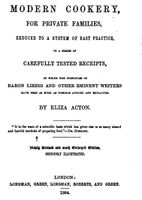Advertisement
Remarks on Home-Made Bread
By Eliza Acton
Published 1845
IT is surely a singular fact that the one article of our daily food on which health depends more than on any other, is precisely that which is obtained in England with the greatest difficulty—good, light, and pure bread—yet nothing can be more simple and easy than the process of making it, either in large quantities or in small. From constant failure, it is nevertheless considered so difficult in many families, that recourse is had to the nearest baker, both in town and country, as a means of escape from the heavy, or bitter, or ill-baked masses of dough which appear at table under the name of household or home-made bread; and which are well calculated to create the distaste which they often excite for everything which bears its name. Without wishing in the slightest degree to disparage the skill and labour of bread-makers by trade, truth compels us to assert our conviction of the superior wholesomeness of bread made in our own homes. When a miller can he depended on to supply flour of good quality, and the other ingredients used in preparing it are also fresh and good, and mingled with it in due proportions, and the kneading, fermentation, and baking, are conducted with care and intelligence, the result will uniformly be excellent bread. Every cook, therefore,—and we might almost say every female servant—ought to be perfectly acquainted with the proper mode of making it; and skill in preparing a variety of dishes, is poor compensation for ignorance on this one essential point.* Moreover, it presents no more real difficulty than boiling a dish of potatoes, or making a rice pudding; and the neglect with which it is treated is therefore the less to be comprehended or excused.

